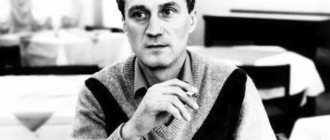Biography
Theater and film actor, People's Artist of Russia Alexey Vasilyevich Petrenko was born into a peasant family. Alexey always gave the impression of being a hard worker. He can do a lot - he was a mechanic, a sailor, a shepherd, he can even make furniture. In his youth, he was fond of sports, engaged in wrestling and boxing.
But of all the hobbies, the drama club was the main one. True, I entered the theater university only the third time. He failed his first two attempts - to the Kiev Theater Institute. Returning from Kyiv, in order not to sit on his parents’ necks, he worked as a blacksmith. They say that blacksmiths are calm, thorough people. This is probably where Petrenko gets such a serious, concentrated look and strong, muscular body. He remembers his former blacksmith colleagues with great respect: “I bow to these people, they gave me no less than my fellow actors.”
And yet Alexey achieved his goal: he entered the theater institute, although not in Kyiv, but in Kharkov. Before the exams, he was very lucky - he met theater figure Trofim Karpovich Olkhovsky. The young man made a great impression on the teacher, and he told the examiners: “Whatever you want to do, but I have this boy. I want it taken out..."
Childhood and youth
In fact, Alexey was born on March 26, although in some sources about the artist’s biography, and even in the passport itself, the date is April 1. The fact is that Vasily Alekseevich came to the village council to register his son on April 1, 1938, and in order to avoid unnecessary questions about the baby’s untimely registration, he named the current day as Alexey’s date of birth.
A muscular guy, Alexey Vasilyevich Petrenko, was fond of sports. His struggle beckoned. Yes, this is understandable, because feeling superior in physical education to his peers, the guy understood what success could be achieved in sports. But a parallel hobby in the drama club took precedence over the sports hobby. Then the head of the theater group of the Palace of Pioneers explained to Alexei the importance of an actor’s appearance, and this could have been hindered by a broken nose and other injuries received as a result of the struggle. Now, observing the impressive list of the actor’s works, it is easy to conclude that the guy connected his future with the theatrical and cinematic stage.
Theater
In 1961, with a diploma as a professional actor, Petrenko entered the service of the Zaporozhye Music and Drama Theater named after Shchors. In 1963-1964 - actor of the Donetsk Regional Russian Drama Theater (Mariupol).
In 1964, he received an invitation from director Igor Vladimirov to the Lensovet Theater in Leningrad. To say that the actor immediately burst into the theatrical life of the northern capital would be wrong. At first, Alexei Petrenko was seen as a sharp-character actor and was trusted with roles like Biondello in The Taming of the Shrew. Petrenko played superbly, but his talent was much broader. Over time, he brilliantly proved this in the images of Count Vorontsov from Pushkin in Odessa, Svidrigailov in Crime and Punishment, Mathias-Moneta in The Threepenny Opera and others.
In the late 70s, Alexey Petrenko moved to Moscow, where he played on various stages: the Drama Theater on Malaya Bronnaya, MXAT, the School of Dramatic Art, and the School of Modern Play.
At the Theater on Malaya Bronnaya, Petrenko played the role of Bolshintsov in “A Month in the Country” (1977) based on the play by Ivan Turgenev, retired soldier Kon in “Enemies” (1978) by Maxim Gorky, Podkolesin in “Marriage” (1978) by Nikolai Gogol.
Roles played at the Moscow Art Theater - a waiter in “Duck Hunt” (1979) by Alexandra Vampilov, driver Henschel in the 1981 play of the same name based on the play by Gerhart Gaup (1982) based on the prose of Mikhail Javakhishvili.
To new roles: to Leningrad, to Moscow!
After graduating from the institute in 1961, Alexey ended up at the Zaporozhye Musical Drama Theater. Then he transferred to the Russian Drama Theater in the city of Zhdanov. As fate would have it, people from Leningrad worked there, who, having assessed the potential of the young guy, told him that with such talent there was nothing to do here and wrote a petition to Igor Vladimirov (director of the Lensovet Theater). Without reading even a line from the letter, Alexey packed his things and left for Leningrad for the main roles.
The director asked Petrenko who he would like to play. Alexey answered: “Knight Tribald.” But this role was assigned to another promising actor. Then Igor Vladimirov advised him to look in the advertisements of the newspaper “Culture” for characters who were required to play in new productions. Petrenko managed to find the role, but this time it was fleeting with only one phrase. But he was happy about this too, because this was the beginning of his creative activity in Leningrad. Over the course of 10 years, Alexey Vasilyevich played the role of Alexey Vasilyevich in eleven performances of the Leningrad City Council. Since 1977, he went to conquer Moscow.
Movie
Alexey Petrenko has been acting in films since 1967. In 1970, he took part in the film “King Lear”, but the artist’s first big film role was Peter the Great in the film “The Tale of How Tsar Peter Married the Arab” by Alexander Mitta (1976), based on the work of the same name by A.S. Pushkin. The actor’s autocrat turned out to be the way historians portrayed him: stern, but fair. Petrenko’s brilliant partner was Vladimir Vysotsky, who played the Arab Ibrahim Hannibal.
The actor’s calling card was the role of Grigory Rasputin in Elem Klimov’s film “Agony.” This film was shot in 1975, but was released only in 1985. Such titans of the stage as Anatoly Papanov, Evgeny Lebedev, Mikhail Ulyanov competed for the role of Grishka.
“When Elem Germanovich invited me to try out for Rasputin,” recalled Mikhail Ulyanov, “he told us terrible details from Rasputin’s life, for example, how his body was buried in one village at night secretly so that no one would see, but this place was still found... I I tried it with a special feeling. Such a powerful role is a gift in the actor’s destiny! Elem was looking for an actor who looked like Rasputin, with his white, scary eyes... I was not approved. It's a shame! But what can you do..."
Klimov invited three psychics, including the famous Messing, to the final screen tests. They approved of Petrenko, and one of the psychics advised Klimov: “Put Alexey in a hopeless position more often. If he doesn’t have the opportunity to think and hesitate, everything will work out.”
Alexei Vasilyevich's filmography includes more than fifty roles, including kings and military leaders, merchants and generalissimos, publishers and judges. Among his works: “Twenty Days Without War” (1976), “Untransferable Key” (1976), “Marriage” (1977), “Portrait with Rain” (1977), “Yulia Vrevskaya” (1977).
He also starred in the films: “Rooks” (1982), “Cruel Romance” (1984), “TASS is authorized to declare” (1984), “Leo Tolstoy” (1984), “The Prisoner of the Château d’If” (1988), “The Feasts of Belshazzar , or a night with Stalin" (1989), "Ruth" (1989), "Politburo cooperative, or it will be a long goodbye" (1992), "The Musketeers twenty years later" (1992), "Agape" (1996), " The Barber of Siberia" (1998), "In August '44" (2000), "Memories of Sherlock Holmes" (2000), "The Idiot" (2003), "The Chess Player" (2004), "Doctor Zhivago" (2005), “Citizen Chief” (2005), “Not by Bread Alone” (2005), “12” (2007), “Lilac Branch” (2007), “The Illusion of Fear” (2008), “Bury me behind the baseboard” (2008), "Yolki-2" (2012) and others.
Alexey Petrenko turns any of his roles, even minor ones, into something significant. Apparently this is why in his filmography there are so many extraordinary personalities who have authority and power over others. The actor is able to convey the bestial insides, sometimes deeply hidden in a person, as rarely does anyone else. His characters, at least, always have courage.
He's been filming quite a lot lately. At the same time, he says that he wants to slowly move away from acting, considering it an activity for the young and energetic. He believes that he has not done anything special in his life, and there is less and less time left - he must have time to repent and atone for his sins.
Alexey Vasilyevich, by his own admission, never had an insatiable desire to work at any cost, even in his youth. Often he voluntarily refused roles, giving them up to those who were eager to play. It got to the point where he disappeared from the director’s sight, and he had to take another actor who dreamed of the role. I am sure that “a little and sensibly is better than omnivorous.” I always doubted: is it necessary, and can I cope?
Elem Klimov once called Petrenko not a character, but a person, saying that this man of diverse talent and extensive talent is sometimes simply present in the frame or on stage, and that is already enough. Because there is a game, and there is a moment of the person’s presence.
Third youth
In 2010, information appeared that Alexey Vasilyevich Petrenko and Azima Abdumaminova had gotten married. He is 72, and she is 30 years younger than her husband. The couple met in White Pillars at a film festival. Azima was an invited guest and represented the Kyrgyz State Film Fund. As fate would have it, like the actor’s second wife, she worked as a journalist.
Their love became the subject of discussion and gossip. They got married in an Orthodox church. The groom wore an Uzbek national costume, and the bride dressed in Ukrainian attire.
Word and music
Alexey Vasilyevich has a special relationship with the word. “The text that he must convey is one tenth of the image for Petrenko. He composes nine-tenths himself. The main thing will be told to the viewer by plasticity, facial expressions, rhythm, intonation, manner of speech, breathing,” this is what one of the researchers of his talent wrote about Petrenko. Alexey Vasilievich is often assigned to read voice-over text from the author. The very names of such non-fiction films speak volumes: “Russian Idea”, “Time of Great Deceptions”.
Another facet of the actor’s talent is his love for singing, a craving for which appeared from an early age. Over time, he began performing songs in plays, films, and concert programs. His repertoire includes folk songs, romances, spiritual chants, and classics. The actor has a long-standing collaboration with Vladimir Fedoseev and the Bolshoi Symphony Orchestra. At the suggestion of the maestro, Alexey Petrenko participated in the performance of Gavrilin’s vocal-symphonic cycle “Soldier’s Letters” (1995) and Prokofiev’s oratorio “Ivan the Terrible” (1997).
They toured throughout Switzerland, Austria, and Germany. Petrenko says: “It’s such a miracle to perform with a symphony orchestra. If this was all I had left, at the end of my life I would be completely satisfied with how I ended my journey.”
Alexey Vasilyevich loves Russian fairy tales. For a long time the actor read them as if for himself. To the questions “why are you doing this? Who needs this? He answered, smiling: “When I get old, I’ll go to kindergartens and perform in front of children for grub.”
But the dream came true: Alexey Petrenko recorded a 24-episode cycle of Russian folk tales on television.
It is worth adding that Alexey Petrenko is independently studying the Church Slavonic language. He says that this will be useful, because every person’s turn will come to talk with God, and one must be prepared for this...
Movies
Since 1991, Alexey Vasilyevich Petrenko has been a full-time actor at the Maxim Gorky Film Studio. His cinematic biography is no less rich and eventful than his theatrical biography. But such is the magic of television that it is after appearing on screen that an artist becomes widely known.
Alexey Petrenko as Stalin
Petrenko's screen debut took place in 1967. Alexey Vasilyevich was offered a small role in Viktor Sokolov’s melodrama “The Day of Sun and Rain”: he played a waiter-farmer. The debut turned out to be successful, and in the early 70s the actor was offered his first major roles. In the black and white two-part film directed by Grigory Kozintsev “King Lear” based on the famous Shakespearean tragedy, Alexey Petrenko played the role of Oswald.
Petrenko’s first big role was Peter the Great in the cult film by Alexander Mitta, “The Tale of How Tsar Peter Married the Arab.” In the actor's performance, the autocrat turned out to be the way most historians describe him: stern, but fair. In this film, Alexey Petrenko played in a successful duet with Vladimir Vysotsky, who appeared in the image of the Arab Ibrahim Hannibal.
Alexey Petrenko as Peter I
Another star role was played by Alexei Petrenko in 1981 in the historical drama “Agony” by Elem Klimov. The artist was entrusted with the main character - Grigory Rasputin. The rights to the film were sold abroad: the film was seen in France, Italy and America, it received many awards, including the Golden Eagle Grand Prix.
“Agony” was released on the Soviet screen only in 1985. In addition to Petrenko, key characters Anatoly Romashin, Alisa Freindlikh and Leonid Bronevoy played in it. Alexey Vasilyevich managed to incredibly accurately convey Rasputin’s hot, unbridled temper.
Alexey Petrenko as Grigory Rasputin
Later, Alexey Petrenko was repeatedly attracted by directors for roles where it was necessary to play strong personalities. Several times he played Stalin, reincarnated as Ivan the Terrible and Ataman Platov. But the actor played weak, desperate people no worse: you can see this by watching Dinara Asanova’s social drama “Trouble,” where he perfectly played the village alcoholic Kuligin.
Later, Alexey Petrenko repeatedly proved his incredible talent for transformation, playing a variety of characters. He became either the vile Svidrigailov in “Crime and Punishment”, or the merchant Mokiy Parmenych Knurov in “Cruel Romance”, or the pilot Stroganov in Alexei German’s drama “Twenty Days Without War”.
Alexey Petrenko in the film “Idiot”
In the new century, Alexey Petrenko also did not get lost and was one of the most sought-after artists in Russian cinema. In 2003, a new film adaptation of Fyodor Dostoevsky’s novel “The Idiot” was released. In the series of the same name by Vladimir Bortko, Alexey Petrenko got the image of General Ivolgin, a half-crazed drunken man, whose character the artist conveyed with stunning realism. The main characters of the drama were played by Evgeny Mironov, Vladimir Mashkov and Lidiya Velezheva.
Fans saw their favorite actor again in 2006: Alexey Petrenko appeared in the film adaptation of Boris Pasternak’s novel Doctor Zhivago. In the series of the same name directed by Alexander Proshkin, Alexey Vasilyevich played Thaddeus Kazimirovich, once again proving to viewers and film critics that they had true talent in front of them.
Alexey Petrenko in the film “12”
In 2007, Petrenko brilliantly played the fifth juror, a pensioner and former Metrostroy employee in Nikita Mikhalkov’s acclaimed legal detective story “12.” This film brought together a constellation of artists: Sergei Makovetsky, Valentin Gaft, Nikita Mikhalkov, Sergei Garmash and many others, whose names have long been known to cinema lovers.
Viewers received a new surprise from the talented actor in 2009, when the psychological drama “Bury Me Behind the Baseboard,” based on the story by Pavel Sanaev, was released. Alexey Petrenko played Sasha's grandfather.
Alexey Petrenko in the film “Bury me behind the baseboard”
In the same year, the premiere of the historical series “Wolf Messing: Who Seen Through Time” took place on the Rossiya TV channel. The dramatic film was warmly received by both viewers and film critics and received high ratings. Alexey Petrenko once again reincarnated as the almighty Joseph Stalin.
2010 was marked by the premiere of the war drama, Nikita Mikhalkov’s dilogy “Burnt by the Sun 2: Imminence,” but the most expensive Russian film with a budget of 40 to 55 million dollars was a box office failure. In December 2011, viewers watched a 13-episode television version of the film, in which they saw Alexey Petrenko in the role of an elderly lieutenant accountant. As expected, there was not a single complaint about the artist’s work: according to established habit, he “gave his best” on the set.
Alexey Petrenko with the Golden Eagle film award
Alexey Petrenko also starred in the New Year's comedy film "Yolki-2", which appeared in theaters in mid-December 2011. In this melodrama, he reincarnated as Grigory Pavlovich Zemlyanikin, a pilot and lover of Yulia Snegireva. In 2012 and 2014, the actor beloved by millions appeared in the TV series “Petrovich” and “Departing Nature.”
In addition to the above-mentioned roles, critics and spectators note the images of Podkolesin in “Marriage”, the journalist Paul Dick in “TASS is Authorized to Declare” and the Abbe Faria in “The Prisoner of the Chateau d’If” as the best performed by Alexei Petrenko. The artist’s filmography includes more than 80 films and TV series.
In addition to acting, the artist was often involved in dubbing films and audio books. Alexey Petrenko especially loved to voice Russian fairy tales and at one time recorded a 24-episode “fairytale” cycle. He once admitted that when he retired, he would go to kindergartens for free and read fairy tales to children. In 2016, the hero Coppelius spoke in the voice of Petrenko in the puppet cartoon “Hoffmaniad”.
Alexey Petrenko in recent years
One of the artist’s last film works was the French-Russian film “Victor,” which was released in 2014. The key roles in the thriller went to Gerard Depardieu and Elizabeth Hurley. The film premiered in Moscow in early September 2014, and was shown in New York in October.
Alexey Petrenko was an Orthodox man and a deeply religious man. It is known that in July 2010 he was elected a member of the Patriarchal Council for Culture from the Russian Orthodox Church.
Personal life
The actor's first wife was singer Alla Petrenko. The second wife, Galina Kozhukhova-Petrenko, was a famous journalist, a member of the Writers' Union, and worked for a long time as a theater columnist for the Pravda newspaper. Petrenko lived with Galina for more than 30 years. She died in 2009. “Galya was ill for a long time and seriously, especially in recent years,” recalls the actor. And when she was gone, I was completely at a loss. There is little choice ahead: lonely old age and illness. And the Lord seemed to hear.” In 2010, Petrenko married for the third time. His wife was Azima Abdumaminova, a Kyrgyz journalist. She is 30 years younger than Alexey Vasilyevich.
Alexey Vasilyevich said that he and Azima “have a daughter. For this I am very grateful to her. Although I treat all her children and grandchildren as family. We are happy - maybe this is annoying, so they spread tall tales about us. “What else is valuable about Azima is that she has no jealousy towards Galina. She is helping me write a book about my late wife. Galusya was very bright, beautiful, her friends jokingly called her Klepa, not only because she was a meter tall with a cap, this nickname is from the name Cleopatra. They also called her “Simone Signoret”. She has the same eye shape. Who wasn’t in love with Galusya before she met me? And I was lucky. We lived together for 31 years. I was happy with Galusya.”
The marriage of actor Alexei Petrenko to an Oriental woman intrigued many. As eyewitnesses said, Moscow has not seen such bright and multinational celebrations for a long time. The newlyweds were congratulated at the Georgian khinkal restaurant on Arbat. The bride's mother flew in from Kyrgyzstan, and the groom's relatives flew in from Ukraine. They sang songs in Greek, Georgian, and Uzbek.
Personal life of Alexey Petrenko
In 1960, Petrenko married opera singer Alla, who already had a daughter, Polina, from her first husband. The couple lived together for 19 years, but eventually the family broke up. In recent years, Alexey and Alla lived in different cities (the actor in the capital, the singer in Leningrad), and in Moscow Petrenko began an affair with journalist Galina Kozhukhova.
Alexey Petrenko with his daughter Polina
After the divorce, daughter Polina stayed with her father - Petrenko insisted on this. Subsequently, Polina, who failed to enroll in Pike, returned to her mother in the northern capital. The actor's first wife, daughter and granddaughter moved to Munich.
Alexey Petrenko and Galina Kozhukhova lived together for 30 years
Alexey lived with Galina Kozhukhova for about 30 years. He raised her son from her first marriage, Mikhail Kozhukhov, as his own. Petrenko’s adopted son later became the host of the “Around the World” and “In Search of Adventure” programs. A happy family life was destroyed by the death of Galina in 2009.
Alexey Petrenko and Azim's third wife
In 2010, Petrenko married journalist and documentary director Azima Abdumaminova (Rasulova), who was 32 years younger than the actor. They got married in Kyrgyzstan. Azima has four children, three of whom are from a previous marriage. Almost immediately, the journalist gave birth to Alexei’s daughter Aliya (in some sources, Alexei’s paternity is questioned due to his already very advanced age at that time). The actor’s eldest daughter, Polina Petrenko, publicly called Azima a marriage swindler aiming for an inheritance. Alexey Petrenko reads poetry and sings Petrenko had an excellent voice and hearing, and in the 1990s he gave several concerts at which he performed opera arias, romances, Russian and Ukrainian folk songs, and musical parodies.
Alexey was a believer. His family never denied the existence of God. Even as a child, having passed the stages of “I want to be a doctor” and “I want to be a military man,” he became eager to become a priest. Having confessed to his mother that he wanted to enter the seminary, he heard: “Don’t even think about it, son, they won’t let you live in this country then.” When he was almost 60, he felt a strong desire to go to a monastery, but the priest dissuaded him - because of his age. But all his life Alexey lived as a true Christian, guided by the principles of Holy Scripture.
Titles and awards
Honored Artist of the RSFSR (1984)
People's Artist of the RSFSR (1988)
People's Artist of Ukraine (1999).
Knight of the Order of Merit for the Fatherland, IV degree (1998)
- 1977 - All-Union Film Festival Award for Best Performance of a Male Role (“Untransferable Key”)
- 1994 - Prize for Best Actor (“Politburo Cooperative,” or It Will Be a Long Farewell”) at the IFF of Slavic and Orthodox Peoples “Golden Knight”
- 1998 — Winner of the Russian Presidential Award “For Contribution to Russian Cinema” at the Kinotavr Film Festival in Sochi
- 1999 — State Prize of the Russian Federation in the field of literature and art (for the film “The Barber of Siberia”)
- 1999 - Prize for Best Actor (“The Barber of Siberia”) at the film festival “Vivat Cinema of Russia!” in St. Petersburg
- 2000 - Prize for Best Actor (“Listen, is it raining…”) at the Window to Europe film festival in Vyborg
- 2001 — Winner of the “Recognition” prize at the film festival “Vivat, Russian Cinema!”
- 2003 - Winner of the “Unfading Audience Love” prize at the film festival “Vivat, Cinema of Russia!”
- 2007 - Golden Eagle Award for Best Actor in a Leading Role (film “12”).
- 2008 — Special prize of the organizing committee of the International Film Festival. Andrei Tarkovsky "Mirror" - "For outstanding contribution to world cinema."
- 2008 - Honorary Prize “For Honor and Dignity” at the national film award “Golden Eagle”.
- 2009 — Prize “For creative contribution to Russian cinema” at the festival “Vivat Cinema of Russia!”
Based on materials from the sites: kino-teatr.ru, Tele.ru, kinopoisk.ru, vokrug.tv, 7 Days, Uznayvse.ru, Sobesednik.ru, Ok-magazine.ru, RIA Novosti.
Filmography: Actor
- Outgoing nature (2014)
- Victor (2014)
- Petrovich (2012)
- Fir trees 2 (2011)
- Burnt by the Sun 2 (2011), TV series
- Burnt by the Sun 2: Imminence (2010)
- Wolf Messing: Seeing Through Time (2009), TV series
- The illusion of fear (2008)
- They do not renounce loving... (2008), TV series
- Strawberry Time (2008)
- Wedding. Case. Death (2008)
- House on the Embankment (2007)
- Branch of lilac (2007)
- Running on the Waves (2007)
- 12 (2007)
- Citizen Chief-3 (2006), TV series
- Family Dinner (2006)
- Doctor Zhivago (2005)
- Citizen Chief-2 (2005), TV series
- Not by Bread Alone (2005)
- Chess Player (2004), TV series
- Earthly and Heavenly (2004), documentary series
- Idiot (2003), TV series
- The Collector (2001)
- Memoirs of Sherlock Holmes (2000), TV series
- In August '44 (2000)
- Fortune (2000)
- Listen if it's raining (1999)
- The Siberian Barber (1999) /Barber of Siberia/
- Agape (1996)
- Road to the Slaughter (1995)
- Russian idea (1995)
- Pirate Empire (1994)
- Are you wearing a tailcoat? (1993)
- Blitz (1993)
- Sensation (1993)
- Shooting Angels (1993)
- Angel of the Harvest (1992)
- Cooperative "Politburo", or It will be a long goodbye (1992)
- The Musketeers, twenty years later (1992)
- Presence (1992)
- Candles in the Dark (1992)
- Lesson (1992)
- Game for Millions (1991)
- Bad Apartment (1990)
- Sphinx (1990)
- The Art of Living in Odessa (1989)
- Belshazzar's Feasts, or Night with Stalin (1989)
- Ruth (1989)
- Prisoner of the Chateau d'If (1988)
- Our armored train (1988)
- Servant (1988)
- Without Sun (1987)
- Women's Club (1987)
- V. Davydov and Goliath (1985)
- Mr. Gymnasium Student (1985)
- Day of Wrath (1985)
- Cruel Romance (1984)
- Leo Tolstoy (1984)
- An Incredible Bet, or a True Incident That Ended Well (1984)
- TASS is authorized to declare... (1984)
- Rooks (1982)
- Farewell (1982)
- Emergency Train (1980)
- Trouble (1978)
- Yulia Vrevskaya (1978)
- Marriage (1977)
- Untransferable Key (1977)
- Portrait with Rain (1977)
- Twenty days without war (1976)
- The Tale of How Tsar Peter Married a Blackamoor (1976)
- Agony (1974)
- King Lear (1970)
- A Day of Sun and Rain (1967)
Actor career
After graduating from the institute in 1961, Petrenko worked for two years at the Zaporozhye Musical and Drama Theater. Shchorsa. This was followed by a year of work at the Donetsk Regional Russian Drama Theater in the town of Zhdanov.
Alexey Petrenko began his creative career in provincial Zhdanov (now Mariupol). Photo from the theater poster of those years
In 1964, director and teacher Igor Vladimirov, to whom workers of the Zhdanov Theater wrote a letter with a request to take the talented guy, invited Petrenko to the Leningrad Theater. Lensovet, where Alexey worked for the next 13 years.
Footage of Petrenko’s first film role is not so easy to find today. In 1966, the actor starred in the film “Chief of Chukotka,” in which he played a small role as a bandit. But just before the premiere, director Vitaly Melnikov was ordered to cut out the robbery scene in which Petrenko appeared (although the actor’s name remained in the credits), since the very fact of “banditry” seemed unacceptable to the censors, disgracing the Soviet system.
Alexey Petrenko in the film “Marriage”
But Alexey had no idea about this. He invited his good friend to the premiere and experienced great embarrassment when he did not see himself in the film. But director Melnikov felt guilty and ten years later invited Petrenko to play the role of Podkolesin in the film “Marriage.”
A year later, viewers were still able to appreciate the acting talent of 29-year-old Alexei, when he appeared in a small role in the melodrama “The Day of Sun and Rain” by Viktor Sokolov and Edward Radzinsky.
Alexey Petrenko as Rasputin (“Agony”)
Until 1974, Petrenko was mainly involved in theater (several films and performances with his participation were released during this period) and appeared in small roles in films. The turning point in Alexei’s film career was the main role in Elem Klimov’s historical drama “Agony,” in which the actor played Grigory Rasputin.
It is interesting that before approving Petrenko’s candidacy, the director decided to organize a meeting between the actor and the main secular predictor Wolf Messing. Many years later, Alexey starred in a series dedicated to this mysterious man, whom he knew personally. Filming "Agony" took a lot of strength and energy - in the end, Alexey was taken to the ambulance with angina pectoris. However, the drama became the artist’s calling card and received several prestigious awards, although it appeared on Soviet screens only in 1985.
Alexey Petrenko in the image of Great Peter in the film “The Tale of How Tsar Peter Married an Arab”
Working with a famous film director attracted the attention of other masters to a little-known actor at that time, who was already almost 40 years old. In 1976-1977, Petrenko played several roles that were memorable to the audience: in Dinara Asanova’s films “The Non-Transferable Key” and “Trouble”, in the historical melodrama by Alexander Mitta “The Tale of How Tsar Peter Married the Arab” (with Vladimir Vysotsky) and the comedy “Marriage” based on Gogol’s play of the same name (dir. Vitaly Melnikov).
Alexey Petrenko and Oleg Efremov on the stage of the theater
In 1977, Petrenko moved to Moscow. From the moment he moved to the capital until 1992, the actor managed to work at the Theater on Malaya Bronnaya, the Taganka Theater, the Moscow Art Theater, the Moscow Theater-21 and the School of Modern Play.
Alexey Petrenko and Alisa Freindlikh in the film “Cruel Romance”
In 1984, Petrenko got the main role of the wealthy merchant Knurov in Eldar Ryazanov’s film “Cruel Romance,” in which Larisa Guzeeva made her debut. The film was a resounding success with audiences and received several prestigious awards. Knurov, played by Petrenko, was not a typical mercantile businessman - he demonstrated sincere reverence for the beauty of Larisa Ogudalova.
Yuri Solomin and Alexey Petrenko in the film “TASS is authorized to declare...”
Alexey was given the leading roles: “Leo Tolstoy” (dir. Sergei Gerasimov), “TASS is authorized to declare...” (dir. Vladimir Fokin), “Day of Wrath” (the first Soviet horror film from director Sulambek Mamilov), “Belshazzar’s Feast, or Night with Stalin” (dir. Yuri Kara), etc. Petrenko’s roles were not the same: an American journalist, the English King Charles I, a simple forester, Blessed Luke, a gang leader, a Portuguese monk, and even Joseph Vissarionovich Stalin and his double. Alexey was also invited to work in foreign projects - in France, Bulgaria, Germany. In the theater he was involved both in plays by Turgenev, Chekhov and Gogol, and by Vampilov, Dostoevsky and Gorky. Alexey Petrenko in the program “Around Laughter” (1985) By the collapse of the USSR, his extensive filmography had already accumulated 50 roles, and even more appeared subsequently. There could have been even more of them, but at times the actor fell into a “minor” mood. The desire to act and act disappeared. If at such a time he received new offers, he refused - his soul was not in the mood for work. Many directors took this as manifestations of a “quarrelsome character.”
Alexey Petrenko in the film “The Barber of Siberia”
After the collapse of the Union, Petrenko acted less frequently. But everything returned to normal in 1998 - with the role of the daring drunkard general Radlov in Nikita Mikhalkov's The Barber of Siberia. In 2000, he was approved for several important roles at once. In particular, the actor played the British writer Arthur Conan Doyle in Igor Maslennikov’s incredibly popular series “Memories of Sherlock Holmes” with Vasily Livanov and Vitaly Solomin, and appeared in Georgy Danelia’s comedy “Fortune” with Vakhtang Kikabidze. Alexey Petrenko in Nikita Mikhalkov’s film “12” In his seventies, Alexey continued to work hard: his most striking works in the period from 2001 to 2008 can be called the roles of General Ardalion Ivolgin in the film adaptation of Dostoevsky’s novel “The Idiot” (dir. Vladimir Bortko), the head physician in series “Doctor Zhivago” based on the work of Boris Pasternak, Malkin’s boss in the series “Citizen Chief” and a labor veteran in Nikita Mikhalkov’s detective story “12”.
Alexey Petrenko in the film “Bury me behind the baseboard”
At the end of 2009, Sergei Snezhkin’s film “Bury Me Behind the Baseboard,” based on the story of the same name by Pavel Sanaev, was released on big screens. A poignant drama about complex relationships in a family, in which Petrenko played the protagonist’s grandfather, who has been putting up with a tyrannical wife (Svetlana Kryuchkova) all his life, received a great response among viewers and critics.
Alexey Petrenko played Stalin several times
In the same year, Petrenko played Stalin twice: in the biographical series “Wolf Messing: Seen Through Time” and the British film “Into the Storm” by Thaddeus O’Sullivan. Thus, throughout his entire career, Alexey appeared in the image of the Generalissimo of the Soviet Union as many as five times, including the image of the double of Joseph Vissarionovich.
Alexey Petrenko and Ivan Urgant in “Yolki”
In 2011, Alexey starred in the leading role of the elderly lover Grigory Zemlyanikin in the popular comedy “Yolki-2”, and in 2014 he played a Soviet writer in the melodramatic series “Departing Nature”, which was presented on Channel One. Alexey’s latest film work was the role of Grigory Zemlyanikin in the continuation of the New Year’s comedy film “Yolki-5” and the role of the presenter in the documentary “Teachers in Love” (directed by Azim Rasulova). Interview with Alexey Petrenko











